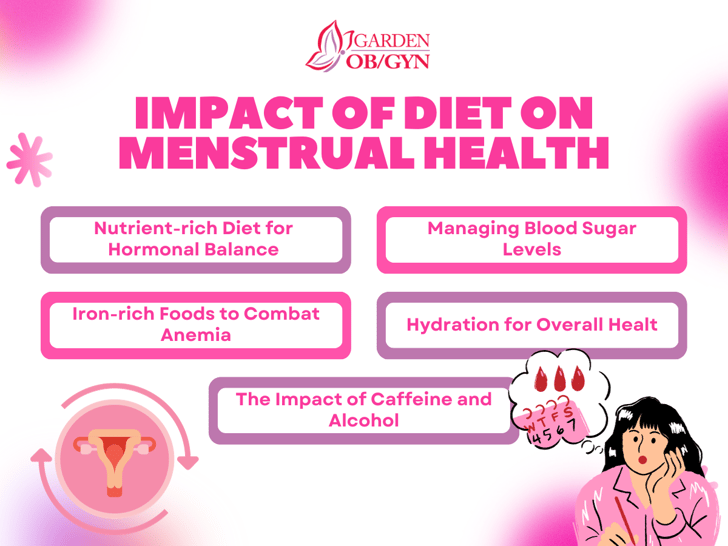Diet's Role in Menstrual Health
In this article, we will explore the connection between diet and menstrual health, emphasizing the importance of making informed dietary choices to support a balanced and regular menstrual cycle.

Menstrual health is a crucial aspect of a woman's overall well-being, and various factors, including diet, play a significant role in maintaining a healthy menstrual cycle. The food we consume can influence hormonal balance, energy levels, and overall reproductive health. In this article, we will explore the connection between diet and menstrual health, emphasizing the importance of making informed dietary choices to support a balanced and regular menstrual cycle.
- Nutrient-rich Diet for Hormonal Balance:
Hormonal balance is essential for a regular menstrual cycle. Nutrients such as vitamins, minerals, and essential fatty acids play a crucial role in supporting the endocrine system, which regulates hormone production. Foods rich in omega-3 fatty acids, like fatty fish, flaxseeds, and walnuts, can help reduce inflammation and promote hormonal balance. Additionally, incorporating a variety of colorful fruits and vegetables provides essential vitamins and minerals that contribute to overall reproductive health.
- Managing Blood Sugar Levels:
Consuming a diet with a low glycemic index can help regulate blood sugar levels, which is particularly important for women with conditions like polycystic ovary syndrome (PCOS) or insulin resistance. A stable blood sugar level helps prevent insulin spikes, which can disrupt hormonal balance and contribute to irregular menstrual cycles. Choosing whole grains, legumes, and complex carbohydrates over refined sugars and processed foods can positively impact blood sugar control.
- Iron-rich Foods to Combat Anemia:
Many women experience iron deficiency or anemia, leading to fatigue and potential disruptions in the menstrual cycle. Consuming iron-rich foods such as lean meats, beans, spinach, and fortified cereals can help prevent or alleviate iron deficiency. Adequate iron levels are crucial for maintaining healthy blood and preventing heavy menstrual bleeding, a common symptom associated with iron deficiency.
- Hydration for Overall Health:
Staying well-hydrated is fundamental for overall health, including menstrual health. Dehydration can lead to cramps, headaches, and bloating during menstruation. Water is essential for proper digestion, nutrient absorption, and detoxification, all of which contribute to a healthy menstrual cycle. Women should aim to drink enough water throughout the day, and herbal teas can be a hydrating and soothing alternative.
- The Impact of Caffeine and Alcohol:
Excessive caffeine and alcohol consumption can potentially disrupt menstrual health. Caffeine can affect estrogen levels, potentially leading to irregular cycles, while alcohol may interfere with hormonal balance and liver function. Moderation is key, and women should be mindful of their caffeine and alcohol intake, especially if they experience menstrual irregularities.
Maintaining a balanced and nutritious diet is vital for supporting menstrual health. The impact of diet on hormonal balance, blood sugar levels, and nutrient status highlights the interconnectedness between nutrition and reproductive well-being. By making informed dietary choices, women can empower themselves to optimize their menstrual health and contribute to overall well-being. It is advisable to consult with healthcare professionals or nutritionists for personalized advice based on individual health conditions and needs.
































